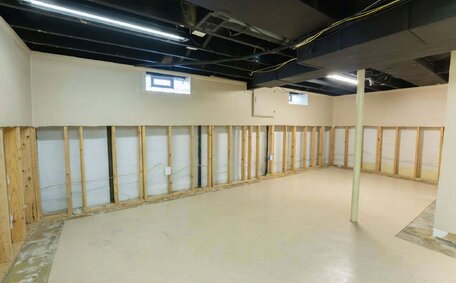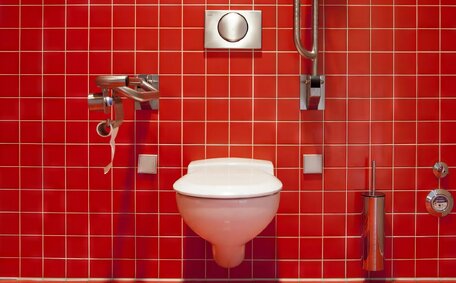What is Water Hammer and What Causes It
Water hammer, also known as hydraulic shock, is a loud banging noise occurring when water flow in a pipe stops abruptly, creating a shock wave that resonates through the plumbing system.
Typical causes of water hammer involve:
- Abruptly halting water flow at all taps or faucets
- Abrupt closure of valves or actions to shut off water
- Your washing machine or dishwasher abruptly starting or stopping its cycle
- Flushing a toilet
Water hammer typically occurs when valves close too swiftly, halting fast-moving water and generating shock waves. Shock waves arise from the sudden stoppage, causing noise, shaking, and banging of pipes against framing or walls. Fitting water hammer arrestors typically reduces noise and safeguards pipes against potential damage.
Symptoms of Water Hammer
There are some clear signs to observe for when odd sounds emerge, signaling your water hammer in the pipes:
- Loud banging or thudding noises when water is turned off suddenly. This hammering sound may occur in pipes within your wall or under floors.
- Rattling pipes as the shock wave passes through.
- Issues with your hot water appliances like dishwashers or washing machines stopping mid-cycle.
- Leaking occurs from the cold hot water pipes or joints when the fittings are jarred loose by the banging.
- Damage to valves and pipe fittings over time.
So if you detect loud thuds or banging when closing taps or employing appliances, it’s a probable sign of your noisy plumbing issues like water hammer. The more pronounced and recurrent the din, the graver the problem can become. Catching such disturbances early allows for the procurement of a plumber to fix issue before it results in extensive destruction.
Dangers and Damage Potential of Water Hammer
If overlooked, water hammer can significantly harm and damage your plumbing network. The sudden pressure spikes from water hammer can damage your joints, valves and fittings by putting excessive strain on them.
Continual stress from water hammer may lead to leaks, fractures, or burst pipes. This can lead to water leaks causing flooding, mould issues and damage to walls, floors and ceilings.
Other potential effects include disruptive noises interrupting flow water through your home:
- Pipes making banging sounds due to loosened pipe fittings resulting in leaks
- Displaced valves over time
- The pipe noises generated can disrupt sleep or impede concentration
- Potential damage to appliances when repeated pipe impact occurs
- Higher water bills from leaks
- Contamination if pipes burst unexpectedly
Proactively fixing noisy pipes can help mitigate the loud banging noises your pipes make and avoid expensive repairs down the track. You can install water hammer arrestors to tackle issues, which is an efficacious strategy that absorbs shock waves prior to overwhelming the pipes.
How to Prevent Water Hammer
Several strategies can be employed to prevent water hammer:
- Fit an air chamber or hammer arrestor to absorb the shock wave before it propagates through the pipes. Water hammer arresters can be situated adjacent to problematic zones.
- Adjust tap valves by replacing old ones with 1/4 turn or ball valve designs that close gradually, reducing water hammer. Additionally, secure them to pipes using adjustable attachments for smoother valve closure.
- Eliminate trapped air in your water system - Upholding air water integrity in air chambers and ensuring a complete system can reduce the echoes traveling through pipes that add to water hammer.
- Use flexible supply lines - These can dampen the effects of water hammer, particularly if water pressure is too high.
- Reducing water pressure can alleviate water hammer and address noisy pipe issues; installing a pressure reducing valve is beneficial.
- Slow closure - Encourage household members to turn water taps and valves off gradually rather than abruptly.
Adopting preventative measures can effectively repair vulnerabilities in your home that may lead to water hammer damage. However, for persistent severe plumbing difficulties, call us; a professional plumber can offer inspection and repair services.
Installing Water Hammer Arrestors
You can install a water hammer arrestor yourself to effectively avert damage from water hammer. Here are the steps for a basic DIY installation:
- Turn off the main water supply and drain the pipes using the shut-off valve.
- Determine the best location(s) for arrestor installation. Ideal spots are near fixtures prone to causing water hammer like washing machines, dishwashers and frequently used taps.
- Make precise, straight cuts into the pipe using a pipe cutter at suitable points with ample space.
- Install arrestors directly onto copper pipes or use connectors for PVC plastic pipes. Ensure proper alignment.
- Secure fittings tightly. Check for leaks during water pressure restoration.
For best results, contact your plumber at St Peters Plumbing on 1300 349 338 for professional installation, especially if your system has complex piping. Our expert technicians can fix the optimal arrestor locations and types to permanently prevent water hammer across your property’s entire plumbing network.
Adjusting Water Pressure
Excessive pressure above 80 PSI can intensify water hammer, as well as increase the risk of leaks and drips. Installing a pressure reducing valve can help lower pressure to a safer 50-60 PSI range.
Here are some tips for adjusting your water pressure:
- Use a pressure gauge to check your current PSI. Attach it to an outdoor spigot or install it directly on your main water line.
- Purchase a whole house pressure regulator if pressure exceeds 80 PSI. This can moderate water flow to all fixtures.
Taking measures to fix water pressure under control can reduce noise issues and prevent leaks over time. But don’t over-reduce flow or you may have problems with some fixtures.
Securing and Cushioning Pipes
Inadequately secured pipes are often a primary source of noise in plumbing systems. As water flows, loose pipes might vibrate and make noise against framing or knock against walls, causing loud banging noises, and highlighting common causes of noisy pipes.
Here are some tips to secure noisy pipes:
- Use metal hanging straps or clips to firmly fasten pipes to floor or ceiling joists. Straps should be snug but not overly tight.
- Wrap sections of pipe with foam pipe insulation to cushion contact points and dampen vibrations.
- Install rubber isolation pads underneath pipes to absorb noise when they touch framing.
- Ensure drain pipes have proper slope support and don’t sag, as this can increase movement and result in making banging noises.
In older homes around St Peters, loosening of pipe straps over time is a common issue contributing to noisy water pipes. Re-securing them stops movement so pipes don’t bang around. Our experts at St Peters Plumbing can assess your pipes to prevent disruptive noise.
Other Causes of Noisy Pipes
Various noises in pipes often indicate issues beyond water hammer:
- Corroded pipes - Mineral deposits and corrosion inside pipes cause turbulence and vibration, which can induce noise as water flows through the roughened interior surface.
- Worn washers and gaskets - Leaky faucet and valve washers or toilet flap valves with gaps can create whistling or hissing sounds.
- Loose pipe mounting - Inadequately secured pipes bang and knock against walls and framing as water passes through.
- High water pressure - Inordinate pressures could cause water to traverse too swiftly, intensifying the resonance from oscillating pipes and fixtures.
- Trapped air pockets - This occurs when air can move through the pipes, creating trickling and gurgling sounds.
- Improperly graded pipes - Incorrect pipe slopes cause gurgles as draining water flows unevenly.
Loose or Rattling Pipes
Pipes that clash against structures or frames due to being unsecured often result in noisy plumbing. As water flows through loose pipes, they can vibrate, causing loud knocking or rattling noises—which are causes noisy water issues.
Indicators that noisy pipes are due to loose mounting include:
- Loud banging or rattling when water is turned on or off
- Noticeable vibrations and movement in the pipes themselves
- Bare pipes or sections without insulation touching walls or studs
- Evidence of existing pipe damage from repeated banging
To prevent noise from loose pipes, use metal straps, brackets, or clips to secure them firmly to framing.
Insulate contact points with pipe insulation to cushion visible water lines. Ensure drain pipes have proper slope support to prevent noise.
For professional pipe securing services, contact the licenced technicians at St Peters Plumbing on 1300 349 338. We service the St Peters area and can properly refasten noisy, rattling pipes.
Worn Washers and Components
Washers and gaskets within plumbing fixtures can wear out or loosen over time. This allows pipes water to pass through with gaps, creating whistling, dripping or hissing noises.
Signs that worn faucet washers are causing noise include:
- High-pitched squealing or whistling when taps are turned on
- Dripping sounds coming from your taps, even when completely shut
- Taps needing to be turned on with much greater force
To fix, replace old compression faucet washers with new ones of the correct size. Ensure they are properly seated within the faucet body. Rubber O-rings inside mixers and shower heads can also wear out, causing flow restrictions and odd chattering noises.
If your toilet flapper valves leak, they can produce continuous running water noises. Listen for this or check for constant refilling after flushing. Swap out the flapper for a new seal to stop water escaping.
Find out what’s causing noise and get additional assistance diagnosing and replacing worn washers, O-rings and toilet valves by contacting our team at St Peters Plumbing on 1300 349 338.
Mineral Buildup and Sediment
Mineral deposits and sediment can accumulate within water pipes, interrupting water flow and leading to noise in hot water systems. As water flows through the roughened mineral coating, it creates turbulence and vibration, causing rumbling or rattling noises.
Signs of mineral buildup in hot water pipes include:
- Reduced water flow from taps or shower heads
- Gurgling, rumbling, or vibrating sounds from pipes or the hot water heater
- Discoloured water indicates issues with cold and hot water systems, especially when noted upon initial use.
- Rattling or banging noises from your water heater
To address noises from mineral build-up in your piping, the plumbing your home depends on:
- Flush your hot water heaters annually to clear sediment
- Install whole house water filters or softeners to prevent scale
- Apply chemical drain cleaning solutions to eradicate present accretions
- Replace old galvanised piping prone to rust accumulation
For expert assistance with descaling pipes or hot water systems, contact the licenced technicians at St Peters Plumbing on 1300 349 338. We service the St Peters area and can restore flow and stop noises from mineral buildup.






